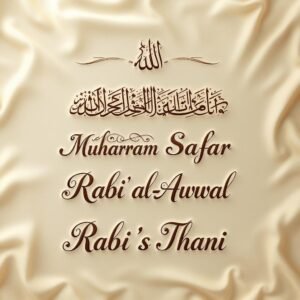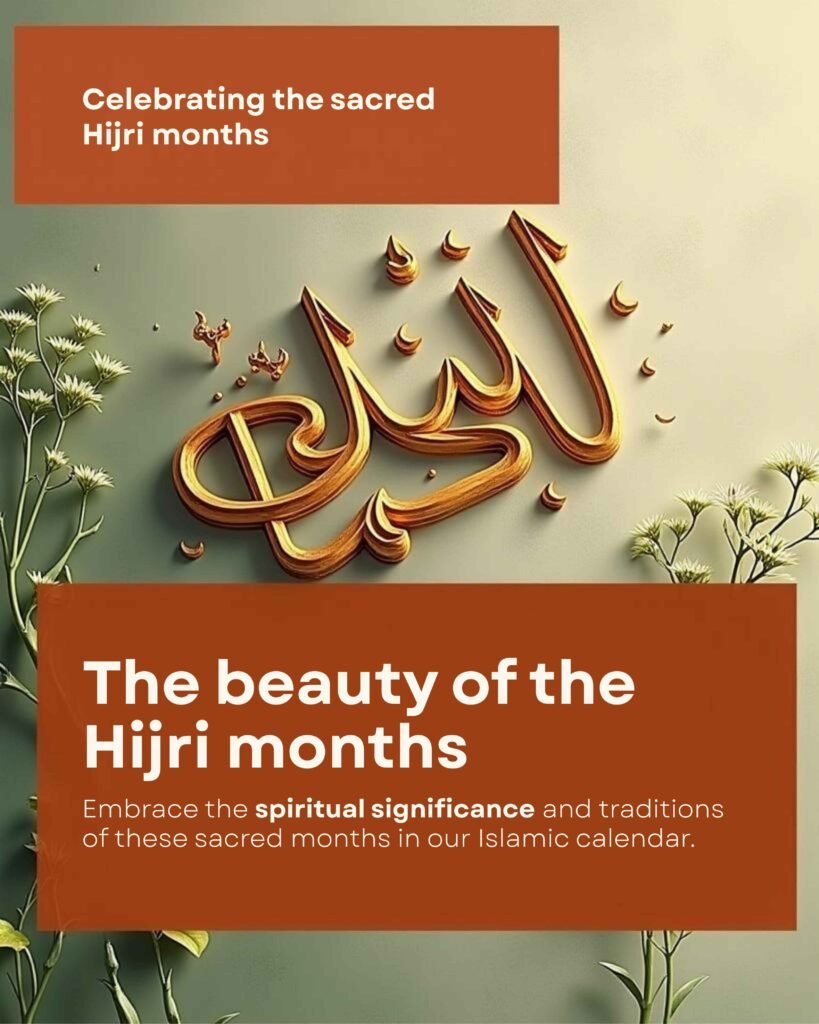Why Hijri Calendar Matters for Muslims Today
Table of Contents
ToggleIntroduction:
The Islamic calendar is so much more than a timeline; it’s a spiritual, historical, and emotional resource for Muslims everywhere. Sadly, many of us have come to the exclusive use of the Gregorian calendar for purposes that bypass this sacred time line we have with our own Prophet Muhammad (Peace be upon him), the Sahaba, and in the broader range of milestones in Islamic history.
Summary:
This blog takes you on a soulful exploration of understanding the importance of the Islamic calendar using the Quran, Sunnah, and the uplifting stories of the beloved Sufi saints. You will come to rediscover that this calendar is not just a system regarding dates, but a compass with a navigational direction for us spiritually, emotionally, and historically.
You will discover how returning to this calendar has the potential to deepen your connection with Allah—tears of repentance, softer hearts, and returning to Iman and faith.
Features of the Islamic Calendar:
- A Divine Connection: The Hijri Calendar began with the Hijrah – the beloved prophet, Muhammad (peace be upon him), migration to Medina, was so extraordinary that it is the basis for our calendar.
- Spiritual Seasons: As a personal example, months like Ramadan, Dhul Hijjah, Muharram, and Rajab all have connection to worship, forgiveness, and renewal. The Hijri Calendar makes sure your life connects to Allah’s mercy all year round.
- Sunnah-Based Living: Following the Hijri Calendar is a way to revive the Sunnah. Whether it is fasting on the white days or using the months of shahrul haram, the Hijri Calendar brings barakah into your everyday life.
Why the Islamic Calendar Is Essential Today:
In our increasingly disconnected world, the Hijri Calendar remains the light of divine time. While the Gregorian system is based on solar cycles and cycles of seasons, the Hijri Calendar is based on lunar cycles – soft, humble, and congruent to the illuminated signs of Allah. Each month of a Hijri calendar commences with the sighting of the moon – a symbol of simplicity and witness to divine, spiritual Economics.

Spiritual Roots:
The Islamic calendar connects us to the beloved Prophet Muhammad (peace Be Upon Him). Muharram was the month the Prophet would fast in order to remember Musa (AS). Ramadan – the month of the Quran – can only be marked by using this calendar. The days of Hajj, Arafah, Ashura, and Laylatul Qadr all fall within this blessed time.
Quran & Sunnah References:
- Surah At-Tawbah (9:36) says: “Indeed, the number of months with Allah is twelve [lunar] months in the register of Allah.”
- Hadith (Bukhari): The Prophet (peace be upon him) said: “The time has returned to the same state which it had when Allah created the Heavens and the Earth.”
These references illustrate that the Hijri Calendar is not a man-made, it is divine.
Sufi Stories: When Time Melts Hearts:
One day, a disciple of Sheikh Abdul Qadir Jilani (RH) came to him crying because he was confused about the worth of his time. The Sheikh said, “My son, time is your best witness. The believer who respects sanctity of time, honors His Lord.”
He instructed him to mark his spiritual progress by the Hijri months, particularly in Muharram and Sha’ban to find out how close he was to Allah every cycle.
In the same way, Khwaja Gharib Nawaz (RH) would begin every Muharram in seclusion, weeping in gratitude to Ahlul Bayt while renewing his covenant with Allah. The Hijri Calendar was his road map for spiritual progress.
Why Every Muslim Must Return:
- For reviving the Sunnah.
- For remembering events in Islam;
- For spiritual orientation of our lives;
- For an accurate appreciation of sacred nights/days;
- For promoting emotional bonds to the people of the past in Islam;
Why You Should Use the Hijri Calendar:
- Revives memories of the Prophet’s Hijrah
- Encourages fasting on sacred days of the year such as: Ashura, and Arafah
- Recognizes spiritually significant months (such as Ramadan);
- Aids in organizing Zakat, Hajj, and Sadaqah;
- Helps to cultivate a spiritual consciousness of time.
Conclusion:
The Islamic calendar is not an antiquity – it is, rather, a living gift from Allah to Muslims. It calls on Muslims to count their lives, not in worldly accomplishments, but rather in acts of worship, periods of repentance, and memories of the righteous. May Allah give us the tawfiq to accept this calendar, and live our lives intentionally.
Explore More Spiritual Reads:
5 FAQs On Islamic Hijri calendar
Frequently Asked Questions
1. What is Hijri Calendar?
2. Why do Muslims use Hijri Calendar?
3. May we use Gregorian with Hijri?
4. Is it in Quran?
5. How can I start using Hijri Calendar?
- All Posts
- English Blogging

7 Heart-Melting Truths About Tears in Sujood,One Step Toward Allah That Changes Everything Introduction Tears can be shed either out...

The First Step to Allah: Take One Step Toward Allah and Watch His Mercy Run to You The authentic Hadith...

Introduction In all times, when hearts distance themselves from Allah, and faith appears to be overshadowed by worldly turmoil, Allah...
Connect with Us on the Path of Knowledge & Light
Are you ready to embark on a journey of Islamic learning and spiritual growth? Please reach out.




